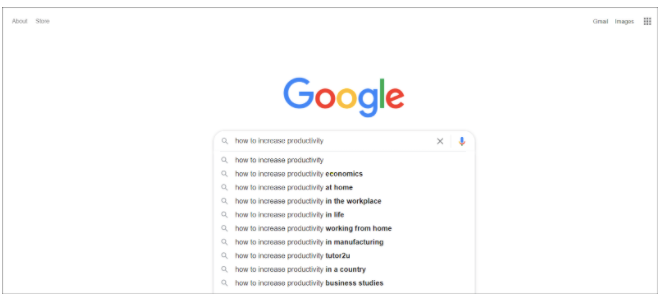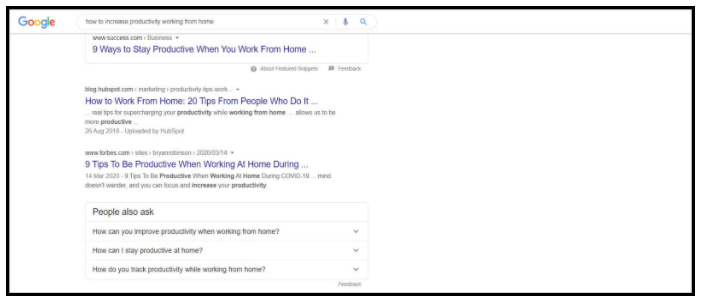Using Google to find content worth writing
The golden rule of blogging is to write something that people want to click on and read (and, of course, ensuring that the content on the page matches what the audience is searching for). You could go down the route of sending the blog to your email list and sharing on social media, and this may be a good idea to get a few eyeballs on your content in the short-term. However, to make your content work for you in the long-term, you need to be ranking highly in Google for popular keywords. This ensures a near-constant flow of individuals interested in your topic flowing through your website and helps you grow both organically and quickly. As mentioned above, you could use free or paid tools to identify potentially lucrative keywords. However, there is an easier option – Google search. Keyword tools (including the one provided by Google itself) provide estimations on monthly visitors, but these figures are not always accurate. What you should try instead is to start typing your proposed topic into the Google search bar and see if autocomplete will suggest results. If autocomplete suggests your topic, you may be on to a winner. The reason for this is that autocomplete relies on historical data of actual searches rather than estimations, meaning if autocomplete suggests a topic, there is likely enough interest to warrant a blog post on that subject. Here is a step-by-step guide:- Go to www.google.com
- Start typing in your proposed topic slowly. After 3-6 words, the autocomplete feature should start suggesting results.
- Check the list of suggested searches and see if your proposed topic is on the list.
- If it is on the list, it could make a great blog topic. If not, try again by rephrasing your search.
 Imagine in this example that I have a blog about productivity. Any of those results would be a good topic for a blog, as the Google autocomplete feature is telling us that people are searching for those keywords.
Imagine in this example that I have a blog about productivity. Any of those results would be a good topic for a blog, as the Google autocomplete feature is telling us that people are searching for those keywords.
Using Google to assess “searcher intent” of your topic
So now you’ve identified a topic that people are likely interested in. But now, you need to ensure that it is actually possible to rank your blog at the top of the SERP results. The key to ranking highly is ensuring that your blog provides the best answer to what your potential audience is searching for. This is where searcher intent comes in. Searcher intent simply refers to the reason why someone is searching for something in Google. They could be searching for many reasons, but the two main reasons are to learn about something or to buy something. Therefore if you’re looking to rank highly for a given search term, you need to ensure that the searcher intent lines up with the content on your page. Going back to the productivity example, if someone searches “where to buy natural productivity supplements”, it is likely that sales pages will be returned, as it’s quite clear here that the intention of the searcher is to buy something. As this is their intention, Google would be unlikely to display your blog post talking about methods to increase productivity, as that is a post designed to teach people. On the flip side, if someone searches “how to increase productivity working from home”, the intent is likely to learn about tips and methods, rather than buy something, so Google would be likely to rank a blog with content discussing that. The good news is that it’s not hard to assess searcher intent. It’s as easy and simple as searching your proposed topic in Google and looking at some of the results. If you notice they are all blogs or articles, that’s a good sign. If they’re all product or sales pages, then writing a blog for those exact keywords may not be worthwhile. As the results for “how to increase productivity whilst working from home” returns only blogs and articles on the first page, there is a good chance that your blog could too.
As the results for “how to increase productivity whilst working from home” returns only blogs and articles on the first page, there is a good chance that your blog could too.
Using Google to assess competition around your keywords
Now you’ve identified a topic worth writing about, and have qualified the search intent. Does this mean you are automatically going to rank high in Google? Unfortunately, no. Another aspect of ranking that you need to take into account is competition (the authority of sites currently ranking for your target keywords). The higher the authority, the harder it would be to be for your content to get ahead them in the SERP results). The good news though is that you can get a good gauge of this through Google search. A good indication of competition is whether or not you recognize the websites that come up in the results. If it’s the BBC, Forbes, and the New York Times, it’d be a safe bet to assume these are authoritative sources and therefore would be hard to rank ahead of them. If the results come up with blogs from SME’s, personal blogs, or the results don’t answer the question you are searching, then there is a good chance you would be able to rank highly. It’s not the end of the world if the original keywords you researched are answered by high authority sites. You can simply keep the research you have already done but try to focus on a more niche or specialized topic, decreasing the chances that one of the high authority sites have delved deep into the topic. Top Tip: If you search your topic and can only find answers in specialized or generalized forums (e.g. Quora, Reddit, etc.) then this is a good indication you can rank. Individuals tend to only ask questions on forums if they can not find the answer in the SERP results. This says to you that there is a demand for answers on a topic and no competition to fill it. You can come in and fill that gap.How to use Google to structure your blog post
Now you have found your topic, qualified the search intent, assessed the competition, and now have sat down to write the post. You know the main question that you want to answer, but not too sure how to get there. Google search results again can help to plan the structure of your blog and provide great ideas for sub-headings and other things to talk about that your target audience will find interesting. The key here is the “people also asked” box at the top of the results page and the “searches related to” at the bottom. Here are the “people also asked” box for the search term “how to increase productivity working from home”: In this example, Google suggests three searches. Two of them are very similar to the original search term, however, one is not (”How do you track productivity while working from home”). This gives you a good indication that people are interested in this topic, and it would be worthwhile to discuss in your blog.
Here are the “searches related to” section for our search terms:
In this example, Google suggests three searches. Two of them are very similar to the original search term, however, one is not (”How do you track productivity while working from home”). This gives you a good indication that people are interested in this topic, and it would be worthwhile to discuss in your blog.
Here are the “searches related to” section for our search terms:
 Again, don’t use anything that is too similar to your original search terms as you don’t want to be repeating yourself or using duplicate content.
From this section, we can see that people are interested in “tech tips for working from home” and “work from home tips for managers”. These would, therefore, be great things to include in your blog.
To summarise, you don’t need fancy keyword tools to be able to write good content. Google search can help you find your topic, qualify the search intent, assess the competition, and provide the structure of your blog.
Therefore for ease of use, price, and the fact that you can get the information you need in an incredibly short amount of time means that Google should be your first stop when planning your content.
Now that you’ve got the skeleton of your blog in place, follow these on-page optimization tips to ensure you give your blog the best chance of ranking highly on the results page.
Again, don’t use anything that is too similar to your original search terms as you don’t want to be repeating yourself or using duplicate content.
From this section, we can see that people are interested in “tech tips for working from home” and “work from home tips for managers”. These would, therefore, be great things to include in your blog.
To summarise, you don’t need fancy keyword tools to be able to write good content. Google search can help you find your topic, qualify the search intent, assess the competition, and provide the structure of your blog.
Therefore for ease of use, price, and the fact that you can get the information you need in an incredibly short amount of time means that Google should be your first stop when planning your content.
Now that you’ve got the skeleton of your blog in place, follow these on-page optimization tips to ensure you give your blog the best chance of ranking highly on the results page.






